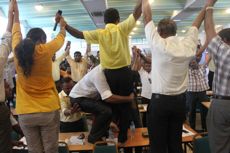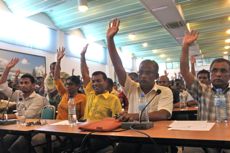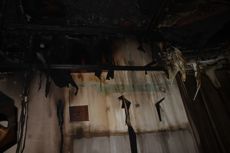The stock price of the Indian infrastructure giant operating Ibrahim Nasir International Airport (INIA) took a tumble on the Mumbai Stock Exchange following the ousting of former president Mohamed Nasheed last week, as images of the unfolding violence were beamed around the world.
GMR has made a US$511 million investment in the Maldives’ international airport. The price of shares in GMR Infrastructure, which was contracted to develop INIA by the previous government, dropped by almost five percent on February 7 following news that fierce clashes between security forces on the streets of capital Male’ had led to Nasheed’s resignation.
GMR’s share prices quickly recovered over the following few days, as Vice President Dr Mohamed Waheed Hassan Manik was sworn in, and rain tempered public demonstrations which on Wednesday turned violent after police attacked a march by members of Nasheed’s Maldivian Democratic Party (MDP).
Speaking on February 11 about foreign investments in the Maldives, Dr Waheed said that foreign investors should not be concerned about the political upheaval affecting their interests in the Maldives, but hinted that some investments may come under scrutiny.
“We will not target anybody for political reasons,” he said.
“If there are any reasons for concern over investment, of course any steps that need to be taken will be taken.”
Speaking specifically about the contract with GMR, Dr Waheed said he would not approach the deal “from a political perspective”, adding, “It is not our intention to harm GMR. Our objective will be to resolve concerns of the public [regarding the company].”
GMR’s stock price continues to teeter this week.
“Short term fluctuations”
Speaking to Minivan News, one of India’s leading political economists Paranjoy Guha Thakurta observed that the political situation in the Maldives has affected GMR to a certain degree but pointed out that “GMR is also politically influenced in the Indian state of Andhra Pradesh.”
Thakurta said that the fluctuations in GMR’s stock prices should be seen in a wider context.
“These are short term fluctuations,” he said: “By and large, the markets of the world have been in limbo for some time. India’s stock market has been politically prone in the past year. I wouldn’t read too much into it,” he said.
The multi-million dollar deal to operate and dramatically expand the Maldives’ international air hub has been the target of controversy from the political opposition, much of it flowing from the Dhivehi Qaumee Party (DQP), a member of which – Dr Mohamed Jameel – is now the country’s Home Minister.
Nasheed’s government offered GMR, in partnership with Malaysia Airports Holdings Berhad (MAHB), the 25-year contract in June 2010. Since that time, various opposition parties including Dhivehi Rayyithunge Party (DRP), Dhivehi Qaumee Party (DQP), Jumhooree Party (JP), and the People’s Alliance (PA) have questioned the contract’s legality while former airport employees have protested against what they have claimed is a foreign take-over of their business domain.
Opposition parties have accused MDP cabinet members of having “vested interests” in the deal. In late 2011 the DQP took their objections to press and produced a 24-page book claiming the deal would “enslave the nation”, while former DRP leader and current deputy leader of the Progressive Party of the Maldives (PPM) Umar Naseer said last year that his party would re-nationalise the airport if it came to power.
While Dr Waheed is not a member of PPM or DRP, Naseer’s recent actions indicate shared interests. On January 31, a delegation of the December 23 Coalition, including Naseer, declared its allegiance to Dr Waheed amidst protests against Nasheed’s government and called for all military and police forces to back Dr Waheed. Naseer also recently informed the public that he was instrumental in the events and discussions leading up to Nasheed’s resignation.
Speaking to press last week, Nasheed said he had been aware that his vice president was meeting with opposition leaders at his home.
Naseer also told Minivan News in June 2010 that “If [GMR] allowed it, an Israeli flight can come and stop over after bombing Arab countries”.
Nasheed’s government was criticised last year for entertaining a deal with Israeli airline El Al. Following demonstrations in defense of Islam on December 23, in which opposition party and religious NGO leaders spoke against relations with Israel, the National Security Committee advised against the deal.
Past events have shown that GMR is sensitive to political fluctuations in the Maldives. GMR’s price on the stock market saw a 7 percent fall in December, when the Civil Court blocked GMR from deducting an Airport Development Charge of US$25 (Rf385.5) from passengers departing on international flights, according to India’s Economic Times.
Thakurta said, “If they re-open the contract, it wouldn’t hurt them [GMR]. GMR is really big, they’re the company behind Delhi’s new airport, which is India’s biggest airport.
“As in the case of what happened in Mauritius, GMR has had some issues over the charging of airport development fees for passengers, and the same story is being replicated in the Maldives,” he concluded.
GMR unphased
Declining to comment on the stock market fluctuations, GMR CEO of Maldives operations Andrew Harrison said GMR expects the existing INIA deal to be upheld, despite the change of administration in the Maldives.
Speaking to Minivan News, Harrison stressed that the Indian company is “politically neutral” and added that it respects whichever party is in control of the government of the Maldives.
“We’ve always been politically neutral in that our remit is solely about developing and operating the airport,” he said.
“We respect whichever party holds the seat of government in the Maldives. The government change is a change we respect and we remain politically neutral. We’ve got a concession agreement and we are sure that any government in power will respect that agreement. We’ve not heard anything that would make us believe otherwise.”
Several foreign staff working in Male’ as GMR contractors were temporarily relocated to India after both they and their employers expressed concerns over their safety. The political situation in Male’ remains volatile.
Harrison said, “Our only concern is for the welfare of GMR staff, so we have advised them to avoid hotspots where it appears that riots and trouble is breaking out.”
He added that tourists traveling through INIA should not be too concerned about the events in Male’, as the airport and resorts are separated from the capital city.
Harrison said, “The resorts and the airport island are geographically separated from Male’, and we’re also fortunate in the fact that the Maldivian culture is both welcoming and friendly towards foreigners. We’ve seen demonstrations of great hospitality both at the airport and at the resorts, both during and prior to this situation.
“People visiting the Maldives are being made to feel very welcome in the Maldives, despite what’s going on in Male’. The Maldivians have a very warm and nurturing culture and a willingness to welcome visitors – and this won’t be affected by the political situation,” he added.
There have been no political protests at INIA or any of the resorts to date. As such, the majority of current travel advice issued by foreign embassies recommends that tourists specifically avoid visiting the island of Male’, but they are not issuing a blanket travel warning against visiting the Maldives, apart from the Ministry of Foreign Affairs of the Ukraine which advises it citizens to avoid the country as a whole.



